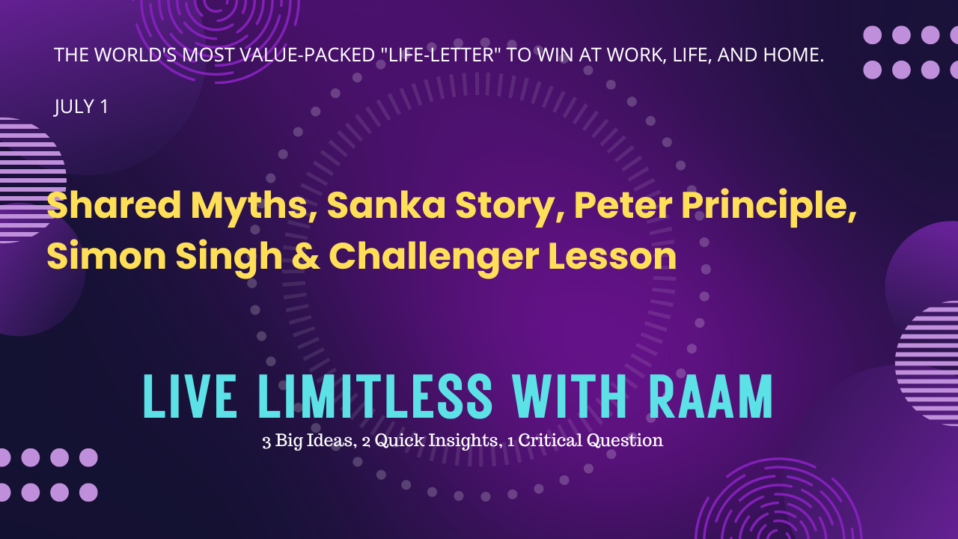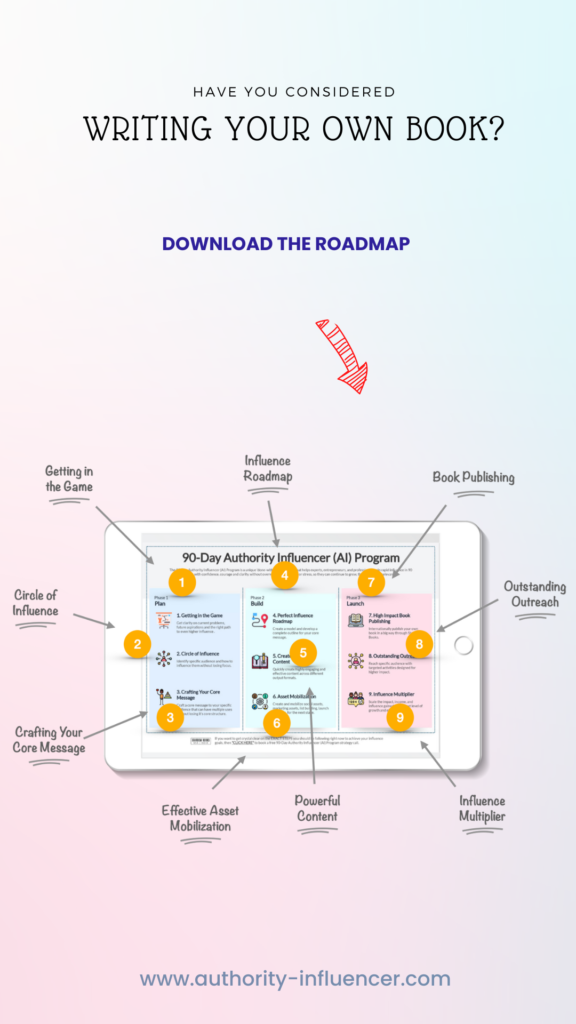Live Limitless with Raam
“The World’s Most Value-packed Newsletter Life-letter to WIN at Work, Life, and Home” with:
3 big ideas, tips or strategies
2 stories, quotes or case-studies
1 critical question to ask yourself
Live Limitless: Shared Myths, Sanka Story, Peter Principle, Simon Singh & Challenger Lesson!!
read on LIFELETTER.RAAMANAND.COM | JULY 1, 2023
____________
3 Big Ideas, Tips or Strategies for this week
1. Shared Myths.
One of the most impactful ideas in Yuval Noah Harari’s book, “Sapiens”, is his notion of “shared myths.” Harari posits that the ability to believe in common myths is what sets Homo sapiens apart from other species and has allowed us to build complex social structures, from tribes to modern nation-states and global institutions.
These “shared myths” are not necessarily false – they encompass laws, belief systems, national identities, money, and other societal constructs that exist because we collectively believe in them and behave as if they are real. For example, money has no inherent value beyond the value we ascribe to it, yet our shared belief in it enables global economies to function.
This idea invites us to examine the shared myths that influence our lives and society. By recognizing them as such, we can better understand the underpinnings of our societies and how our collective beliefs shape the world.
2. The “Peter Principle”.
The Peter Principle is a concept in management theory formulated by Laurence J. Peter. It states that “in a hierarchy, every employee tends to rise to their level of incompetence.”
In other words, employees are promoted based on their success in previous jobs until they reach a level at which they are no longer competent, as the skills in one job do not necessarily translate to another.
The principle implies that in time, every position in a given hierarchy will be filled by employees who are incapable of fulfilling their roles. It’s an argument for why hierarchies can be inefficient, and a reminder to organizations to promote based on potential performance in the new role, not past performance in a current one.
3. Sanka Story.
Sanka, a brand of naturally decaffeinated coffee, was looking to boost its brand image and sales in the late 1970s and early 1980s. To achieve this, they employed a clever marketing strategy: hiring Robert Young, the actor who played the beloved character Dr. Marcus Welby on the popular TV show “Marcus Welby, M.D.”
The logic was straightforward and effective. Dr. Welby, a character associated with wisdom, trust, and authority in the field of health, would be an ideal promoter for Sanka, a coffee that promised no health drawbacks associated with caffeine. By leveraging Young’s established authority and likeability, the brand could communicate its messages more effectively.
The strategy worked well. Consumers accepted Robert Young in his role as a spokesman, associating him with his character’s traits. Consequently, Sanka’s brand image was bolstered, and the coffee saw success in the market. This is a testament to the power of a well-chosen brand ambassador and the impact of authority on consumer behavior.
_____________
2 Stories, Quotes, or Case-Studies for this week
1. From “The Code Book” by Simon Singh.
One fascinating story from this book about the history of cryptography concerns Mary, Queen of Scots. In the late 16th century, Mary was imprisoned in England and involved in plots against her cousin, Queen Elizabeth I. Mary communicated with her conspirators using a code, confident that even if her letters were intercepted, her plans would remain secret.
However, Elizabeth’s spymaster, Sir Francis Walsingham, had a team of codebreakers working for him. They managed to break Mary’s code and read her messages, providing the evidence that led to Mary’s execution.
The story illustrates the crucial role of encryption in history and how the breaking of a code can have dramatic consequences. In this case, Mary’s underestimation of her adversaries’ capabilities in cryptography ultimately cost her life.
2. The Tragic Challenger Lesson.
During the 1980s, NASA was preparing for the launch of the Space Shuttle Challenger. Engineers from Morton Thiokol, the company that built the solid rocket booster for the shuttle, were concerned about the performance of the O-rings in cold weather. They were worried that the O-rings would not seal properly, potentially causing a catastrophic failure.
Despite their concerns, there was immense pressure to go ahead with the launch. The engineers were unable to convince NASA management to delay. The result was the tragic Challenger disaster, which led to the loss of seven astronauts and grounded the Space Shuttle program for nearly three years.
This incident serves as a powerful reminder of the importance of listening to expert advice and prioritizing safety over deadlines or public pressure. It teaches us that sometimes the most difficult decision is the right one and that ignoring potential risks can lead to disastrous consequences.
_____________
1 Critical Question to Ask Yourself
Leveraging authority can effectively boost trust and shape consumer perception, while attentive listening to expert advice can prevent grave missteps. Ask yourself, “Am I harnessing the power of authority in my ventures, and am I truly hearing the voices of experts in my field?”
Did you like this week’s “Life-letter”? Then, don’t keep this to yourself. Share it with others.
Share this life-letter on Twitter, Facebook, Linkedin, WhatsApp or via email.
Or, copy and paste the link below:
http://lifeletter.raamanand.com
Let’s meet again. Until then, Keep Smiling… Believe in Yourself… and Get all the Best Things in Life,
Raam Anand
Publishing Coach to hundreds of first-time authors around the world
Publisher & Chief Editor at Stardom Books (USA/India)
Author of the International Bestseller, Write Now


Post a comment